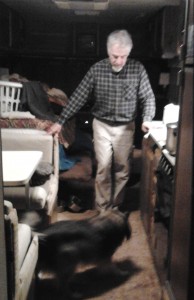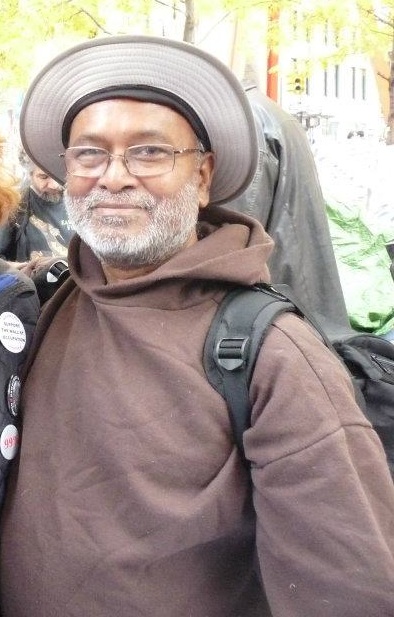Remembering Garda Ghista
C.T. received this today. —WT
Remembering Garda Ghista
by Stephen Lendman
Saturday Feb 25th, 2012
On February 20, activist/scholar/author/humanitarian, and dear friend, Garda succumbed to breast cancer.
On February 22, her son Firdaus reported the sad news. Receiving hospice care, she died in southern Germany. She’d been surviving by what she called “a series of miracles.” She’ll be sorely missed.
Several years ago she moved to India to help feed starving people. Using her own resources and what she could raise, she asked nothing in return.
Months back, she discussed her work on the Progressive Radio News Hour. She asked listeners to help best they could. She explained how little it takes to feed starving people without resources. Without aid, they’ll perish.
She advocated Prabhat Ranjan Sarkar’s philosophy. His spiritual name was Shril Shrii Anandamurti. He was an Indian author, poet, composer, linguist, social revolutionary and philosopher.
He founded Ananda Marga, a spiritual/social organization providing instruction in meditation, yoga, and other self-development practices to anyone wishing to learn them. Affectionately called Baba, he offered various social programs for disadvantaged and other Indians. His writings stressed human welfare and neohumanism.
His work inspired Garda’s socio-economic philosophy. She called it PROUT (PROgessive UTilization Theory). “It stands for the progressive utilization and rational distribution of all the earth’s natural resources. PROUT advocates another type of revolution called ‘nuclear revolution.’ ”
It reflects “every aspect of collective life – social, economic, political, cultural, psychic and spiritual.” It’s completely transformative. “New moral and spiritual values arise in society which provide the impetus for accelerated social progress.”
A new era replaces an old one. “(O)ne collective psychology is replaced by another. This type of revolution results in an all-round development and social program.”
Modern-day world systems destroy life, societies and ecologies. Sustainability’s not their mandate. They feature exploitation and plunder. Another way is vital.
Garda’s writings discussed constructive alternatives. Her World Prout Assembly (WPA) web site featured them. Her advocacy found expression in them. Her life’s work practiced them.
In January 2010, she founded Hearts Healing Hunger. It helps feed hungry people globally. It’s also involved in:
•building emergency shelters for women and girls victimized by domestic violence and human trafficking;
•protecting them from dowry harassment;
•building retirement and nursing homes for the needy;
•constructing libraries and literacy programs;
•establishing medical clinics;
•providing micro credit loans; and
•helping villages build sustainable water systems, check dams, embankments, drip irrigation, shallow wells, strategically located ponds, river and lakeside plantations, and planting thousands of trees.
Longer-term projects include creating ecologically and economically self-sustainable communities.
Most important is feeding the hungry. Initial Indian venues were established in Siliguri, North Bengal and Hyderabad, Andhra Pradesh. Other feeding centers were planned throughout the country. Achieving them depends on personal donations.
With Garda’s death, its site “currently (is) unable to receive money.” Hopefully it will again soon under others continuing what she began. Her work’s too important to disrupt.
It reflects PROUT’s mission “to unite moralists everywhere against exploitation anywhere.” It seeks “unsung heros” to confront oppression in all forms, including extremist fundamentalism, fascism, communism, patriarchy, and predatory capitalism.
They threaten all life forms, including planet earth and humanity. “Struggle starts (with) reclaim(ing) economic sovereignty of local communities.” PROUT sought to “unite all struggles against oppression into one global struggle (for) one world, one humanity, and one family.”
It challenged today’s order for what sustainably helps everyone everywhere. WPA headlined, “Economy of the People, For the People and By the People! Put Economic Power in the Hands of the People! Moralists of the world – unite!”
Garda lived what she believed. Her life’s mission was helping others by establishing life-sustaining initiatives. She gave all selflessly.
It doesn’t get any better than that. This writer was proud to be a friend and ally. Hopefully others will continue her vital work and enlist global support.
With out-of-control imperial wars raging and others planned, as well as deepening economic hardships for growing millions, it’s more than ever needed.
Spread the word, and keep Garda’s spirit alive.
———————————————————
Stephen Lendman lives in Chicago and can be reached at lendmanstephen [at] sbcglobal.net.
Also visit his blog site at sjlendman.blogspot.com and listen to cutting-edge discussions with distinguished guests on the Progressive Radio News Hour on the Progressive Radio Network Thursdays at 10AM US Central time and Saturdays and Sundays at noon. All programs are archived for easy listening.
http://www.progressiveradionetwork.com/the-progressive-news-hour/.
http://sjlendman.blogspot.com
Subscribe to this blog's RSS feed
Learning the Ropes/Walking the Plank/Twisting in the Wind/Cooking My Goose
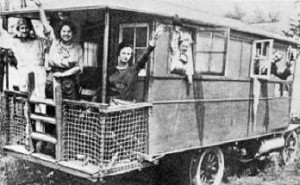 Think twenty-six is old for a motorhome? Well, you’re right. I just had a mechanic tell me he could bring his dad out of retirement to work on my carburetor. But it could be worse! I enjoyed perusing these photos of hilarious motorhomes from history.
Think twenty-six is old for a motorhome? Well, you’re right. I just had a mechanic tell me he could bring his dad out of retirement to work on my carburetor. But it could be worse! I enjoyed perusing these photos of hilarious motorhomes from history.
I seem to have this urge to choose the path that is most unusual, that forces me to stretch in ways those around me doubt I can. I don’t know what karma I’m working out when I dive in. My plans often seem random to others, and yet, I can imagine no other path in the moment.
So, here I am learning about boondocking and electrical systems and gas generators. I’m making mental notes about rubberizing roofs and the proper 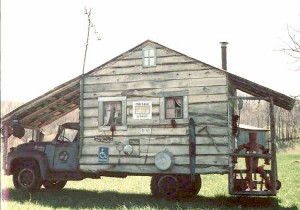 handling of propane tanks. And through each day as we promote our workshop and phone truck mechanics, I can’t wait to get in there and tear out those twin beds, to lay down the found rug I bathed in the sun, to hook my car up to the tow bar.
handling of propane tanks. And through each day as we promote our workshop and phone truck mechanics, I can’t wait to get in there and tear out those twin beds, to lay down the found rug I bathed in the sun, to hook my car up to the tow bar.
So far, however, C.T. gets to play the butch one. He knows more about engines and electrical systems. So I play second fiddle, making confused looks and fetching tools.
Our dog Tuatha has taken to our motorhome Serenity like he’s been waiting for this moment he whole life. We were worried about him, losing the only home he’s ever  known. But Serenity is docked down in the valley, right on Heathcote’s central business district. Tuatha can look out any of the windows and see familiar friends going about their days. He can hop out and pee a message to Chance, the golden retriever who lives here. He’s an extrovert; He’s in heaven.
known. But Serenity is docked down in the valley, right on Heathcote’s central business district. Tuatha can look out any of the windows and see familiar friends going about their days. He can hop out and pee a message to Chance, the golden retriever who lives here. He’s an extrovert; He’s in heaven.
And C.T.’s in heaven, too, not because of the opportunity to get lost in a thicket of tools and motor oil, but because he gets to upgrade to a gas stove! In our old cabin, we didn’t have a proper kitchen. And C.T., as the family cook, had to work magic with a barely working electric hotplate. Now he’s cookin’ with gas, so to speak.
An hour after breakfast, he starts to muse, “What should we have for lunch?” And in the middle of phone calls and internet searches, I hear him brainstorm the dinner menu.
 Remember, C.T. is cofounder of Food Not Bombs (note his spiffy FNB chef’s hat). He was a professional chef for years, and wrote the FNB cookbook. Serenity, with its propane stove and storage for bulk supplies, is his rolling playground. Lucky me!
Remember, C.T. is cofounder of Food Not Bombs (note his spiffy FNB chef’s hat). He was a professional chef for years, and wrote the FNB cookbook. Serenity, with its propane stove and storage for bulk supplies, is his rolling playground. Lucky me!
No, he doesn’t wear the hat every time he cooks! We’ve been having fun moving our belongings in, and it was the hat’s moving day…
I’d been reading that motorhomes have very limited power, compared to a house. So I wasn’t surprised to find out that we need to learn what to turn off before turning something else on.
Since Serenity will be the mobile office for three consensus trainers, we’ll have extra power challenges. How do we power several computers at once? The answer will
eventually be solar panels added to the roof. More on that another day.
For the moment, my computer is still in my old cabin, so now I must sign off and climb down into the valley to Serenity. I guess I’m commuting!
What’s on the list for tomorrow? Phone calls, emails, fundraising and troubleshooting.
Please join our Hippie Chick Diaries fan page on Facebook!
Occupy Asks the Classic Consensus Questions
C.T. and I get hundreds of emails each day, many of them from Occupy activists asking the same cluster of questions about consensus. They love their General Assemblies, as I love Intentional Community, and they can’t see abandoning their GA’s, so they’re desperate to make them work. Their hearts are searching for a way to bring the often shouting voices together. We have decided to share one such email, from OWS activist and workshop student Sati, with his permission. Sati’s words are in italics; C.T.’s answers are in regular font. —Wren
On Feb 9, 2012, at 11:45 AM, Satinath Choudhary wrote:
Dear CT,
I got your book – Consensus for Cities. Thank you very much.
You know CT, in as much as I would love to do things with consensus; my faith in consensus appears to be eroding.
C.T.: I understand your concern. Please keep an open mind towards the consensus process. I suspect the versions of consensus you have seen, especially @ OWS, were created by and practiced by people who had little to no prior experience with any consensus process. They nobly created a process from scratch without much help. It took me years to figure out what I know now and I was learning from people who had years of experience before I came onto the scene. And I was a meeting junkie. I literally went to over 1,000 meetings in one year (avg. 3/day)! Few are willing to invest that kind of time to learn something new. But I was willing and I invested the time. The result, the model of consensus I originally called Formal Consensus, then took me additional years to understand fully and to learn how to teach it to others. In fact, after 25 years, I am still learning about this model and how it operates in group dynamics.
Sati: What do you do when you suspect there are plants in a group that would like the group not to reach consensus – it would like the group to fail to make any decisions?
C.T.: This was my experience back in 1985 when I set out to develop a model of consensus that could not be disrupted by agent provocateurs. In the Quaker-based model of consensus I learned as a young activist between 1980-85, the approach to 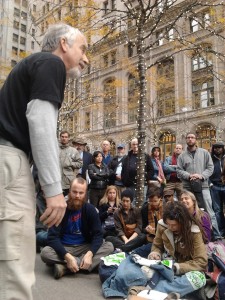 “blocking” was that any one individual could raise a block and, if the group could not satisfy the concern the block was based on, the proposal was defeated. I recognized that while this might be practical in a faith-based community such as the Religious Society of Friends (Quakers), this as unworkable in radical political groups where we know the State sends disruptors.
“blocking” was that any one individual could raise a block and, if the group could not satisfy the concern the block was based on, the proposal was defeated. I recognized that while this might be practical in a faith-based community such as the Religious Society of Friends (Quakers), this as unworkable in radical political groups where we know the State sends disruptors.
To address this problem generally, I recognize and now teach that requiring new people to go through a process of becoming a member of the group was essential. [Consensus for Cities, 1.1 New Member Orientation pp. 88-89 & 1.10 Membership pp. 97-98.] To address this problem more specifically, I developed the concept that “blocks” must be based on the purpose and common values of the group or contradict an existing decision. [On Conflict and Consensus (Third Ed.) 2.3 The Rules of Formal Consensus – Rule #5 pp. 27.]
Sati: What do you do when a group of people who are just too emotional, they start shouting at each other?
C.T.: The problem is NOT that people are too emotional. Just the opposite; people are emotional. Most groups subscribe to the notion that emotions have no place in group decisionmaking. This comes from the practice of using Robert’s Rules of Order. In this process (commonly referred to as “voting”) there is no place in the structure that allows for the expression of emotions. In consensus, the process does allow for the expression of emotion. However, since most people have experiences of using voting where emotions are “out-of-order”, they have learned to express emotions in inappropriate ways (such as shouting).
Additionally, with forms of consensus where there is little structure, an individual has no way of knowing when or how emotions can be appropriately expressed. In a 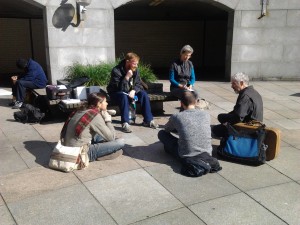 formal consensus process, the structure allows for emotional expression during a time when the group dynamics can easily support the individual and NOT at a time when emotional expression are disruptive or difficult to hear.
formal consensus process, the structure allows for emotional expression during a time when the group dynamics can easily support the individual and NOT at a time when emotional expression are disruptive or difficult to hear.
Sati: Consensus appears to fail even in a small group of people, how can we expect it to work in a large group of people like cities?
C.T.: Almost everyone asks me this question and it is precisely why I titled the second consensus book Consensus for Cities. People think consensus process only works in small groups of like-minded, trusting people. If I thought this were true, I would have given up on consensus long ago. Voting is based on power; it is the process of amassing enough power so that your proposal will prevail by gaining majority support. The consensus process that we teach is based on values; it is the process of identifying, articulating and using the common values of the group to determine if a proposal matches the group’s commonly held values or not. If it does, it is adopted, even if only one member wants the proposal; if it does not, it is defeated, even if everyone wants the proposal (unless the group changes their common values to match the proposal). How to do this process is what we teach in the 2-day workshop.
Sati: They can’t even gather together in one place. It seems to me that representative governance just cannot be avoided. Once the group of representatives is down to around 10 or so, we could possibly think of consensus.  But even in that situation, the interest of the super-rich is diagonally opposite to that of poor. How are they going to reconcile with each other?
But even in that situation, the interest of the super-rich is diagonally opposite to that of poor. How are they going to reconcile with each other?
C.T.: Contrary to popular opinion, the model of governance called representative democracy is NOT democratic. The structure of electing representatives who then make the actual decision for the larger group is called an oligarchy. Democracy is participatory or direct. Once you remove the decision making from “the people” or all the members of the group, it is no longer democracy. Consensus is all about direct, participatory democracy.
The interests of the super-rich are based on values, such as hierarchy, individualism, and competition. The values of OWS are egalitarian, collectivism and cooperation. These are two very different groups of people with different sets of common values that are mutual exclusive. The answer to your question is that they are not going to reconcile anything, especially using consensus process.
Sati: You must know that top governing body of Swiss is federal Executive Council (EC) of seven, elected every four years. They have been ruling the country since 1848 using consensus as their mode of working. Even they have abandoned to use consensus in the last four years after their right wing leader Blocher of People’s Party won support of 30% of country’s vote – more than any other party’s.
C.T.: You have exposed my most difficult problem regarding the version of consensus that I teach. Most everyone, including most dictionaries, see consensus as a form of voting, usually by super-majority or even complete, unanimous agreement. This is the kind of consensus the Swiss Executive Council uses (sometimes referred to as consensus-seeking with a majority vote over-ride).
I believe and teach that consensus process is a completely separate process, not based on voting at all. This is a radical perspective and not yet recognized by the over-culture (although, on the Wikipedia page on consensus, it is given a very brief nod by mentioning the Quaker model). It appears all the other models of consensus mentioned rely on voting in some form or other and much of the entry is devoted to various techniques of voting, such as hand signals, unanimity, etc.
I find this all very ironic since, as far as my research into consensus historically goes, in Western culture, all versions of consensus are based on the Quaker version and the Quakers learned it from the Iroquois Confederacy. Interestingly enough, this is mostly denied in the Wikipedia article, primarily based on the racist notion that “savages” could not have developed such a sophisticated process. It is also interesting to note that nowhere on this page is any reference to the Quaker involvement with the Iroquois or the influence of the Quakers on the founding fathers. (I have much more on this I will save for another time.)
Sati: I am yet to have a look into your book. I would like to read both of your books before I come to your workshop on Long Island.
Best regards,
Satinath
Sati will be attending our Consensus: Body and Soul workshop in Manorville, Long Island, February 24-26, 2012. Registration is still open. This will be our last East Coast workshop before we head west for a while. So take advantage of this chance! Contact us at fiopa@consensus.net for a brochure/registration form. —Wren
Post Script: 3/4/12: Sati and several members of OWS’ Vision & Goals working group, as well as Occupy activists from Boston and Philadelphia, participated in the Manorville workshop. Now Sati and other attendees are helping to recruit for another Consensus: Body and Soul workshop, to be held at the WBAI studios at 120 Wall Street, March 10-11. For more information on this new workshop, visit our facebook event page and call Wren at 410-458-2310.
Please join our Hippie Chick Diaries fan page on Facebook!
Boondockers: A New Social Class
 Some readers might be noting that Hippie Chick Diaries has changed dramatically. “Wren Tuatha’s Complicated Adventures in Simple Living” used to chronicle life in Intentional Community. Then it became the Occupy Diaries. Now brace yourself to follow me into a new form of simple living, boondocking!—WT
Some readers might be noting that Hippie Chick Diaries has changed dramatically. “Wren Tuatha’s Complicated Adventures in Simple Living” used to chronicle life in Intentional Community. Then it became the Occupy Diaries. Now brace yourself to follow me into a new form of simple living, boondocking!—WT
I am a rooted person. I come from farmers who owned the same lands from the Land Grant times to the present day. I thought that, if I wanted to, I could stay in my little homestead at Heathcote Community for the rest of my life. So I rooted and dug deep.
My partner C.T. is a gypsy. If I’m the farmer meme, he’s the nomad. He’s happy in a suburban lifestyle or couchsurfing. He follows the buffalo, or messages on the wind.
So, facing homelessness, we made a creative compromise: we’ll be nomads in a rolling house.
My home for the past sixteen plus years has been Heathcote, my community, my family, my agrarian tribe. We live on 110 wooded acres north of Baltimore, Maryland. For my first five years, I lived in a little springhouse on the stream, with my dog upstairs with me and ducks and a goat down below and grazing around.
 When my dog got too old to navigate that tiny house, I moved my little family up to a larger cabin on the top of the hill. Here, at Hina Hanta, we evolved as a family for ten years. I no longer keep ducks, and dogs and goats and come and gone. So have human partners.
When my dog got too old to navigate that tiny house, I moved my little family up to a larger cabin on the top of the hill. Here, at Hina Hanta, we evolved as a family for ten years. I no longer keep ducks, and dogs and goats and come and gone. So have human partners.
 Now, as Heathcote Community moves into a new phase that doesn’t include occupying these old shacks, my partner C.T., our dog Tuatha and I are leaving this forever home on Tuesday.
Now, as Heathcote Community moves into a new phase that doesn’t include occupying these old shacks, my partner C.T., our dog Tuatha and I are leaving this forever home on Tuesday.
We were touring Occupy sites when we got the news that we would lose our home. Ironically, as Occupy groups shifted from their tent city encampments to indoor meetings and direct actions protesting foreclosure evictions, C.T. and I were deciding not to fight the eviction we faced.
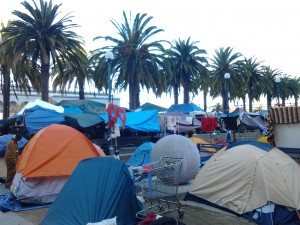 Traveling by car, plane and train to various Occupys, we met many homeless people. Some had been homeless for years, often battling alcoholism and other issues. Others were newly homeless, with stories of Afghanistan or losing children.
Traveling by car, plane and train to various Occupys, we met many homeless people. Some had been homeless for years, often battling alcoholism and other issues. Others were newly homeless, with stories of Afghanistan or losing children.
Many were falling directly out of the middle class. And many middle class protesters were experiencing widespread joblessness as a new normal. Others were twisting their schedules to fit in activism with two and three menial jobs.
Knowing that I didn’t want to be truly homeless with a dog and a partner (shelters allow neither, apparently), I struggled to pool my remaining resources with whatever creativity I had to make a motorhome happen. Even in homelessness, privilege operates, and I have doors open to me.
 C.T. and I were already looking for an RV or tour bus to continue our Direct Democracy Tour of Occupy sites. We had planned to travel constantly with several other trainers, providing workshops and consultation. Our original idea had us raising $20,000 for a used bus or RV. As we learned the limits of our timeframe and our fundraising savvy, we settled on a thirty-four foot 1990 Fleetwood Bounder for $7000. The seller was excited to support our project and gave us a month to find the funds.
C.T. and I were already looking for an RV or tour bus to continue our Direct Democracy Tour of Occupy sites. We had planned to travel constantly with several other trainers, providing workshops and consultation. Our original idea had us raising $20,000 for a used bus or RV. As we learned the limits of our timeframe and our fundraising savvy, we settled on a thirty-four foot 1990 Fleetwood Bounder for $7000. The seller was excited to support our project and gave us a month to find the funds.
It breaks my heart to tell you how close we came to raising that money, gluing donations and loans and wishful thinking together. By my research, this was the least we could spend in the dependable range, imagining a rig that could get us from Maryland to California and back several times.
Then, facing living in someone’s basement, I lowered my definition of “dependable” to mean anything with four walls and a roof that could be mine, drivability optional.
Looking in the $2000-$4000 range, every RV on craigslist needed some repairs, and usually had been parked for years, never good news. We started looking at smaller RV’s, but they didn’t include the queen sized bed we wanted. Privilege again, because the dog must continue to be in the bed with us.!
 This lead us to a 1986 Sportscoach Cross Country, thirty-six feet! The listing sounded like the universe was finally rescuing us—complete repair records—evidence of the thorough/anal seller we love to buy from. New tires, breaks and break lines. A few cosmetic repairs needed.
This lead us to a 1986 Sportscoach Cross Country, thirty-six feet! The listing sounded like the universe was finally rescuing us—complete repair records—evidence of the thorough/anal seller we love to buy from. New tires, breaks and break lines. A few cosmetic repairs needed.
C.T. and I drove nearly four hours away and found ourselves four-wheeling our Honda CRV into a field, marveling at how very long this machine was. We were greeted by Chuck, a chain-smoking, swearing electrician and his Amish wife, Sally. “I have stuff stored in here,” he warned us. We stepped over the hole in the stairwell, where he had dismantled things.
We pulled ourselves up into what I can only describe as the lair where Chuck apparently goes to hide when he’s transformed by the full moon into a chain-smoking ware-gerbil.
Most horizontal surfaces nested piles of cigarette butts, no ashtrays noted. Machine parts nested in every plush chair, bench and couch. Boxes covered the queen sized bed. And little rips of paper swirled and netted in the carpet. Everywhere.
The toilet was oozing. It’s possible Chuck and Sally don’t realize the blackwater holding tank is not self-emptying or a portal to another dimension. To be fair, we do live in an out-of-sight, out-of-mind culture.
Okay, so it turns out that Chuck bought this motorhome from the anal type of seller we like. He’d had it for eight months, living in it while he finished their mobile home. There was a sad story about losing custody of their seven month old child because they were living in an RV.
That’s a story with more to it that what’s told.
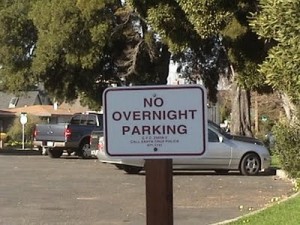 But it brings up to me the fact that there are so many millions—yes, millions—of Americans living full time in RV’s that municipalities are starting to take sides. Some are passing ordinances against parking overnight. In those towns, RVers often get harassed for just parking while they eat in a restaurant—at lunchtime. Other communities, and some of the big box stores, do the math differently. They see these travelers as bringing money into the local economy.
But it brings up to me the fact that there are so many millions—yes, millions—of Americans living full time in RV’s that municipalities are starting to take sides. Some are passing ordinances against parking overnight. In those towns, RVers often get harassed for just parking while they eat in a restaurant—at lunchtime. Other communities, and some of the big box stores, do the math differently. They see these travelers as bringing money into the local economy.
There are now websites listing parking lots where RV’s can park overnight in any given town. These are grocery stores, Home Depots, Lowes, Targets, and yes, WalMart stores.
Looking into RV living, the first lesson was that campgrounds are expensive, $35-$55 per night, and more. Although some have weekly, monthly and yearly rates, if you’re on the go, you can’t do that every night. So my second lesson involved a new vocabulary word: Boondocking.
Of course, as a native of the woods, the geographic concept of boondocks was not new. But I’ve learned that RVers have embraced this idea to refer to dry camping, with no water, electric or sewage hookups. Depending on your level of purity, the term refers to all dry camping, in parking lots to wild areas, or the term must be reserved to the most remote, untamed zones.
Apparently, there are millions of Americans traveling the parking lots, city parks, byways and mountain passes of the land. This may seem eco-unfriendly at first, but my third lesson has been that, for philosophical reasons or pragmatism, boondockers live on a tiny fraction of resources that other Americans do. They limit water use, and then reuse and re-reuse water (flushing toilets with dishwater) and they collect rainwater to use.
Boondockers quickly learn that it’s best to invest the $3000 in a few solar panels, then they’re not rotating their batteries and generator, and not needing to refuel that generator. They can stay independent longer. This becomes a goal that brings boondockers, whatever their politics, to greener and greener simple living.
There’s a real frontier attitude, very independent and individualist. Some boondockers might object to my characterization, pointing out all the website support groups and clubs. But, as C.T. points out in our workshops, there’s the value of cooperation and then there’s the strategy of cooperation.
C.T. tells the classic story of the college football team winning the championship. The reporters ask the coach, “What’s the secret of your team’s success?” He of course answers, teamwork, or cooperation. Very odd, since football is the epitome of violence and competition. The players aren’t concerned about the other team as they plant their faces in the mud. C.T. makes the distinction that they’re using the strategy of cooperation to achieve the goal of winning, of competition.
In that vein, I’m saying boondockers of all stripes are dropping out of mainstream society and forming a new nomadic social class. As people with my limited financial resources and nearly unlimited creativity realize that we’re not going to find real jobs, we fall out and land here. And, like other strata of society, individualism and 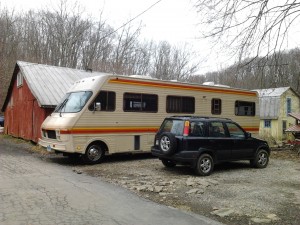 DIY rule. “I gotta get out of Babylon,” one hippie woman posted on a boondocker site.
DIY rule. “I gotta get out of Babylon,” one hippie woman posted on a boondocker site.
Indeed. We are the end of empire. Tear it down. And when there’s no more gas, we’ll each have four walls and a roof and a sense of mine and home.
Post Script: After letting the ‘90 Bounder go (just too expensive) and passing on Chuck and Sally’s rv (just too sad), C.T. and I found a cherry ride in a 31 foot 1986 Bounder, found in Middle River, Maryland. Now we’re boondocking at Heathcote while we work out some bugs in this rv’s systems. We’ve named her Serenity, after the Firefly series.
The adventures of a new Serenity crew begin!
—WT
Please join our Hippie Chick Diaries fan page on Facebook!
